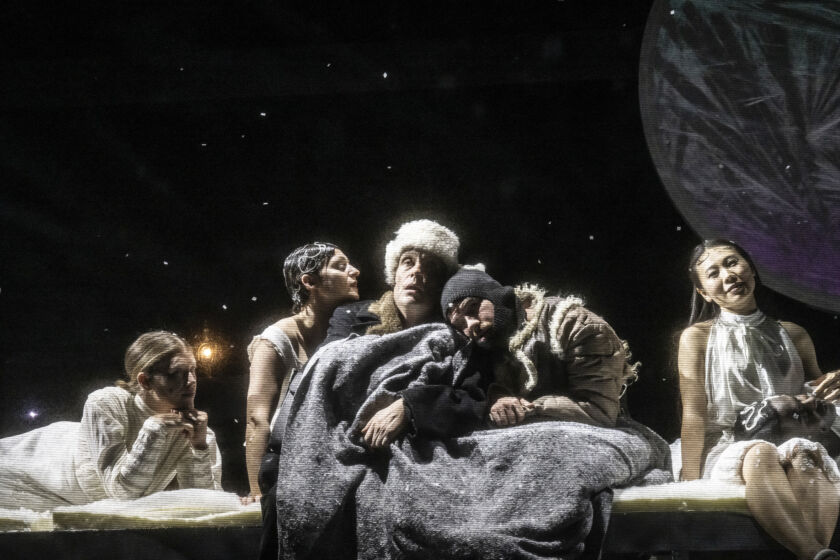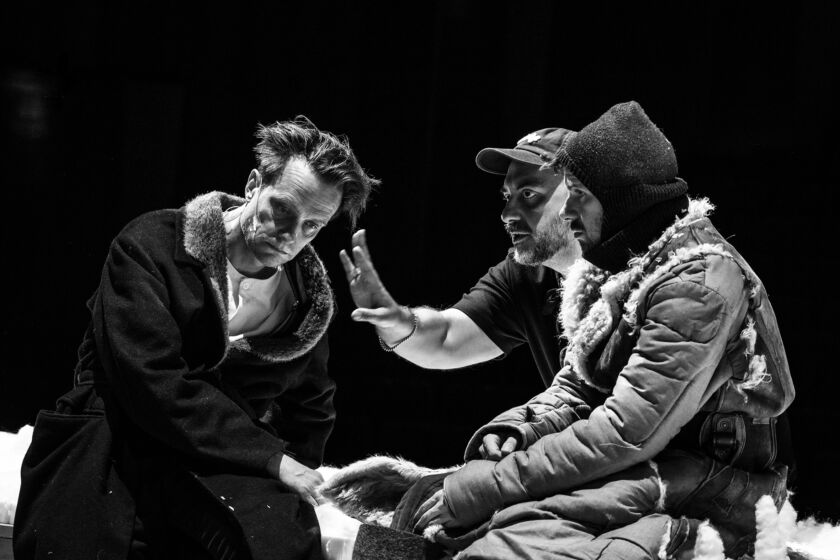The Blizzard
Vladimir Sorokin is considered one of the most important Russian authors, and one of Putin’s sharpest critics. Kirill Serebrennikov dramatizes and stages his novel The Blizzard. An interview with the author.


At first glance, your Blizzard seems a revenant from the depths of Russian literature. It is a condensation, or intertext, of the Russian tradition of snow storms. Your story, complete with a country doctor and a coachman, a feisty miller’s wife, tiny horses and giants, is set in an imaginary future, drawing upon the Russian past, yet basically describing our present time. Does history demand reading material resembling parables?
Vladimir Sorokin: I had long been meaning to write a classic Russian winter novella, in which the metaphysics of the vast space prove stronger than the people. Russia is a vast country, much of it unpopulated. The life of Russians in the provinces depends less on the faraway power in the Kremlin, but is determined to a great degree by this snowy space. In the provinces, people’s way of life and their relationships have not changed for centuries. In this sense, The Blizzard is a time machine with which the author likes to travel from the future to the past. The subject of the story is a classical one in every regard: a doctor, one of the educated class, and an uneducated coachman try to get through a blizzard, to reach the ill and save them. This subject is inextricably linked to Russian provincial life – it is repeated endlessly, and will be repeated endlessly in the future as well. Like a sleigh, it drags along the entire literary tradition of the 19th century.
What are your thoughts and feelings as you consider this text, which you wrote in 2010 – in the short period when not Putin, but Dmitri Medvedev was president, and Russia was visited by lethal wildfires and heatwaves?
Given the vast Russian realm of snow, the Kremlin and its transient rulers are so distant and unimportant that no one takes notice of them. Those in power at the faraway Kremlin change like fata morganas; the only thing that remains real are the snow-covered fields and the attempts by humans to cross them.
You are not only friends with Kirill Serebrennikov: you both left Russia in 2022, after the beginning of the Russian war of aggression against Ukraine, and are now living in exile in Berlin. You dedicated your work Das weiße Quadrat (White Square) to Kirill Serebrennikov while he was under house arrest. Why are you entrusting The Blizzard to him as a director?
A long time ago, when the young director Serebrennikov arrived in Moscow from Rostov-on-Don, he approached me with the idea of directing my play Pelmeni (Honeymoon Trip). For some reason, nothing came of it. Ever since, every time we met, he began our conversation by saying: “I really want to direct a Sorokin.” To which I always replied: “Yes, of course.” And now the time has come! I am delighted at this. I have read the script, I think it’s outstanding. Kirill is a great master of theatre.
Serebrennikov is interested mainly in the novel’s third main character: the blizzard, which he has cast with multiple actors. He is intrigued by the absolute disorientation of the whiteout. What can we experience, perhaps even learn, when we lose control?
A blizzard is a creature that rips the skin of civilization off human beings. Humans remain existentially naked in this snow-covered vastness. In such hopeless situations, the intellectual thinks about Kierkegaard and Nietzsche, while the peasant prays. Any challenge with a metaphysical dimension teaches us to believe in the power of the spirit.
What do you consider the challenges facing the arts in times of war – and at the moment, the very concrete tasks of Russian artists?
In times of war, it seems to me, the task of the arts is to remain arts. That means, the writer must remain a writer and not become a journalist, dedicating his energy to the evils of the day. That’s what correspondents and war reporters are for. Fortunately, all wars end sooner or later, but literature remains. A soldier returning from the war will ask the writer: “What interesting things have you written during this time?” If the writer then answers: “Here are my war reports,” then the soldier will answer: “I’ve had enough of war. I want something different.” And he will be right.
Interview: Birgit Lengers
First published in the Festival insert of Salzburger Nachrichten
